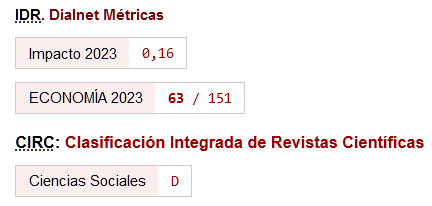La crisis del euro: interpretación contextual y salidas
Keywords:
crisis, euro, finacialization, alternativesAbstract
The euro crisis has a size and nature that are difficult to grasp if its context and causal roots are not clearly set. Prevailing policies and their possible consequences are better known than the underlying problems and interpretations of behaviour. An adequate response to the crisis of the euro has to start from these basics, and trying to avoid simplifications that serve long-term vision to guide decision that requires immediate plight.
Downloads
References
Arias, X. C., Costas, A. (2011), La torre de la arrogancia. Políticas y mercados después de la tormenta, Ariel, Barcelona.
Blanchard, O., Milesi-Ferretti, G.M. (2009), Global Imbalances: In Midstream?, IMF Staff Position Note, December.
https://doi.org/10.2139/ssrn.1525542
Borrel, J., Misse, A. (2011), La crisis del euro. De Atenas a Madrid, Ed. Turpial, Madrid.
Cecchetti, S.G., Mohanty, M.S., Zampolli, F.
-(2010), The future of public debt: prospects and implications, BIS, WP 300, March.
-(2011), The real effects of debt, BIS, WP 352, September.
Costas, A. (coord.) (2010), La crisis de 2008. De la economía a la política y más allá, Nº 18 de la Colección Mediterráneo Económico, Ed. CajaMar.
Duménil, G., Lévy, D.
-(2011a), Dettes souveraines: limites du traitement keynésien d'une crise structurelle, Actuel Marx Nº 51.
-(2011b), Crise et horizons post-néolibéraux, Actuel Marx Nº 51.
Epstein, G. A. (2005), Financialization and the World Economy, Edward Elgar Publishing, Cheltenham.
Espínola, J.R. de (2011), Interacciones recesivas y déficit institucional en la eurozona, Boletín de Estudios Económicos, Vol LXVI diciembre 2011, Nº 204, pp. 405-432.
Gallagher, K. (2011), Regaining Control? Capital controls and the global financial crisis, Working Series Nº 250, Political Economy Research Institute, University of Massachusetts, Amherst. https://doi.org/10.1093/acprof:oso/9780199641987.003.0007
Gros, D.
-(2011a), External versus Domestic Debt in the Euro Crisis, CEPS Policy Brief, Nº. 243, May.
-(2011b), "Yes we can" Europe can solve this crisis - if it wants to, CEPS Commentary, 8 December.
Hernández Vigueras, J. (2012), El casino que nos gobierna. Trampas y juegos financieros a lo claro, Clave Intelectual, Madrid.
IMF
-(2011), World Economic Outlook, September.
-(2011), Global Financial Stability Report, September.
Lapavitsas, C. y otros
-(2011a), Crisis en la Zona Euro: Perspectiva de un impago en la periferia y la salida de la moneda única común, REC, Nº 11, pp 131-171.
-(2011b), Breaking up? A Route Out of the Eurozone Crisis, Research on Money and Finance, Occasional Report 3, November.
Luengo, F., Alvarez, N. (2011), Desde los desequilibrios comerciales a la crisis económica de la Unión Europea, en Gómez, P. J. (ed), Economía Política de la Crisis, Editorial Complutense, pp.145-160.
Martínez González-Tablas, A.
-(2000), Economía Política de la Globalización, Ariel, Barcelona.
-(2002), Globalización y recomposición de los espacios económicos nacionales. El margen de maniobra de las economías en un entorno global, en Palazuelos, E. y Vara, M.J. (coord), Grandes áreas de la economía mundial, Ariel, Barcelona, cap.1.
-(2007a), Economía Política Mundial I. Las fuerzas estructurantes, Ariel, Barcelona.
-(2007b), Economía Política Mundial II. Pugna e incertidumbre en la economía mundial, Ariel, Barcelona.
-(2011a), Contexto y dimensión financiera de la crisis, REC, Nº 11, pp. 22-44.
-(2011b), La financiarización en la economía actual, Papeles de relaciones ecosociales y cambio global, nº 114, pp. 25-36.
Navarro, V., Torres, J., Garzón, A. (2011), Hay alternativas. Propuestas para crear empleo y bienestar social en España, Sequitur: ATTAC, Madrid.
Palazuelos, E. (2011), La economía de Estados Unidos sometida al dominio de las finanzas: vendrán tiempos peores, en Gómez, P.J. (ed), Economía Política de la Crisis, Ed. Complutense, pp.117-144. https://doi.org/10.22201/fe.18701442e.2011.10.40337
Research on Money and Finance, www.researchonmoneyandfinance.org
Downloads
Published
How to Cite
Issue
Section
License
This licence allows third parties to share (copy and redistribute the material in any medium or format) and adapt (remix, transform and create from the material for any purpose, including commercial purposes), provided that authorship and first publication in this journal (The Journal, DOI of the work) is acknowledged, a link to the licence is provided, and it is stated whether changes have been made to the work.







